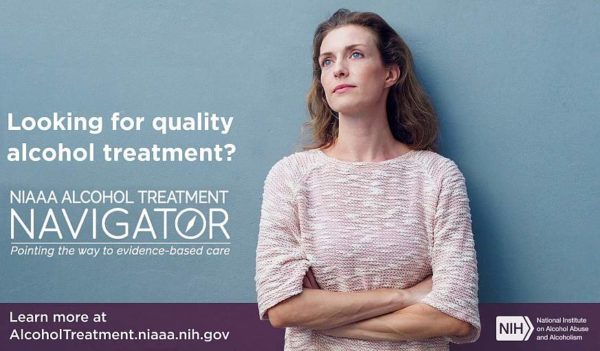
December 1, 2017 |
Exclusive Interview with Dr. Lori J. Ducharme on the New NIAAA Alcohol Treatment Navigator
The Recovery Research Institute spoke with Lori J. Ducharme, Ph.D., Program Director in the National Institute on Alcohol Abuse and Alcoholism (NIAAA) Division of Treatment & Recovery Research about the institutes newly launched Alcohol Treatment Navigator.
CAN YOU TELL US WHAT THE NIAAA ALCOHOL TREATMENT NAVIGATOR IS?
The Navigator is a comprehensive, easy-to-use tool to help individuals and their loved ones navigate the often-complicated process of choosing treatment for alcohol problems. With many treatment options available, the Navigator makes the search easier by telling them what they need to know – and what they need to do – to find quality care that meets their needs.
It includes:
- An overview of alcohol use disorder
- A description of different kinds of professionally-led treatment options
- Step-by-step instructions for searching several existing online directories of treatment providers, including information from the Substance Abuse and Mental Health Services Administration’s Behavioral Health Treatment Locator
- Ten questions to ask a provider, and 5 signs of quality to look for
- A downloadable Toolkit to help organize and simplify the search process
WHY DID THE NIAAA CREATE THIS TOOL & WHAT WERE THE MAIN GOALS?
The NIAAA Alcohol Treatment Navigator was created in direct response to calls that the NIAAA was receiving from the public on a regular basis, asking how and where to find alcohol use disorder treatment. The NIAAA cannot endorse any specific treatment program or provider, but we wanted to give individuals useful, actionable information in an unbiased way, so they could search for themselves. The Navigator focuses on professional treatment providers (physicians, therapists, programs) because those services are most difficult for people to find and compare – that’s the information gap we wanted to fill.
The NIAAA Navigator is more than just a locator; it is a strategy to help individuals go about searching and choosing between different available alcohol treatment providers. Although we provide links to several existing online directories of providers, the Navigator offers helpful advice no matter where you do your search. (For example, people may get a list of providers from their Employee Assistance Programs (EAP) or insurance company, or from a Google search.) The Navigator suggests 5 signs of quality to look for; lists 10 questions to ask a provider; and includes a Treatment Options Chart to help people compare “apples to apples” across providers. In this way, we hope the Navigator will lead to better-informed consumers of alcohol treatment services.
HOW DOES THE TOOL ADDRESS COMORBIDITY AND SUBGROUPS?
It is challenging to develop a tool that gives general advice, but also drills down far enough to relate to individual needs and circumstances. While the Navigator’s main focus is on alcohol treatment, we recognize that many patients have co-occurring mental health, medical, or other substance use disorders that will need to be addressed in the course of treatment. When someone is seeking help for a loved one with a drinking problem, they may only see the drinking, but they should find a provider who can address other co-occurring issues that may be identified in a comprehensive assessment. Included within the Navigator’s “signs of quality” and “10 questions” is advice about finding a provider with expert credentials (e.g., accredited treatment programs, board-certified addiction psychiatrists), who are more likely capable of recognizing and addressing comorbidities. And of course, if someone is already aware of a co-occurring condition, they are encouraged to ask specifically about it when asking the “10 questions.”
WHAT WAS THE PROCESS LIKE FOR CREATING THE TOOL?
The Navigator was the result of a two-year development effort grounded in a review of decades of scientific research on clinical interventions and health services, and with input from people seeking alcohol treatment, treatment providers, and researchers. NIAAA did focus groups and usability tests with dozens of individuals who had been through the process of seeking treatment for a loved one, and adapted the content as needed to fit this target audience.
WHAT WERE THE INCLUSION & EXCLUSION CRITERIA FOR DETERMINING TREATMENT PROVIDERS?
NIAAA cannot endorse or recommend any particular treatment provider. So instead, the Navigator points to existing, online directories of treatment providers that are free to use, and gives instructions on how to search those directories and advice on making an informed choice.
NIAAA chose directories that represented the three main types of professional treatment providers – physicians, licensed professional therapists, and specialty treatment programs – and had broad coverage of the United States.
- For physicians, the Navigator links to the ABAM directory of doctors with board certification in addiction medicine, and the ABPN directory of board-certified addiction psychiatrists. Both directories indicate physicians who have current certification.
- For licensed professional therapists, the Navigator links out to the Psychology Today directory of therapists indicating a specialty area in addiction. Verification icons on the site indicate therapists with a master’s degree and current license.
- For treatment programs, NIAAA created a widget that searches the SAMSHA directory and returns programs that indicate accreditation from The Joint Commission, CARF, NCQA, or the Council on Accreditation.
Although there is a focus on credentials in these directories, the Navigator emphasizes that credentials are only one sign of quality, and that consumers should call both to verify these credentials, and to learn more about the services offered.
WHAT DOES THE FUTURE HAVE IN STORE FOR THE NIAAA TOOL?
The NIAAA Alcohol Treatment Navigator just launched in October 2017. NIAAA is collecting data to assess how the site is being used, and will collect user feedback to consider possible improvements. The expectation is that the site will evolve to keep current with the treatment field. For example, as the board certification process for physician’s transitions from ABAM to the American Board of Preventive Medicine, this may lead to a new directory; the Navigator will be updated accordingly. Likewise, as the science of addiction changes, NIAAA will update the Navigator to reflect the latest advances in treatment.
WHAT IS THE OVERALL HOPE FOR THE NIAAA NAVIGATOR?
We hope that, by providing not just directories but an overall strategy for searching, we can help to create better-informed consumers of alcohol treatment services. We want people to be not only more aware of their options, but also less hesitant to reach out and obtain help. We hope the Navigator allows individuals to feel less overwhelmed by the process, and we tried to accomplish this by developing it from a health communications perspective. If we can make people more comfortable and confident in reaching out to find treatment, we can help close the treatment gap and allow more people to ultimately receive the support that they need.
ABOUT

Lori J. Ducharme, Ph.D., Program Director in the NIAAA Division of Treatment & Recovery Research
Dr. Ducharme is a sociologist and a Program Director in the Division of Treatment and Recovery Research at NIAAA. She received her Ph.D. from the University of Georgia, where she focused on organizational behavior and employee well-being. While working in academic and contract research settings, she studied the evolution of the U.S. addiction treatment system in response to changes in financing, regulation, and the introduction of novel medications and behavioral therapies. At NIAAA, Dr. Ducharme manages a portfolio of research, small business, and training grants that explore ways to increase the adoption and sustained use of evidence-based treatments, enhance the integration of addiction treatment in general medical settings, and improve service access and utilization.

